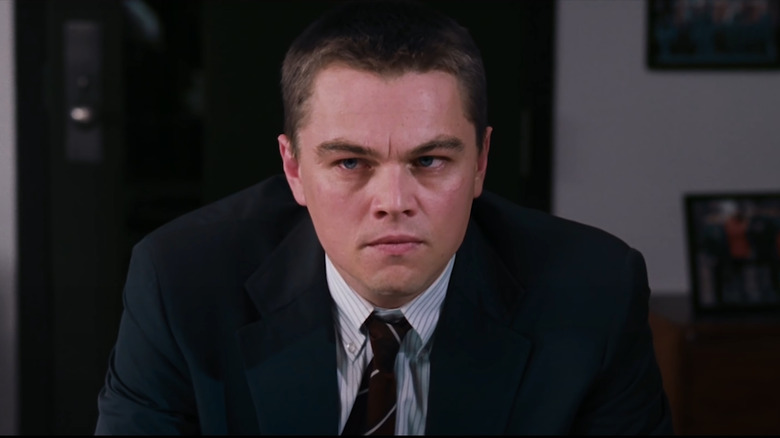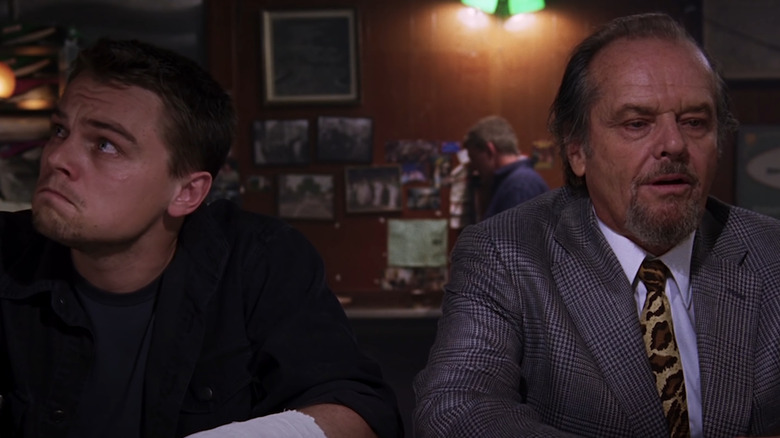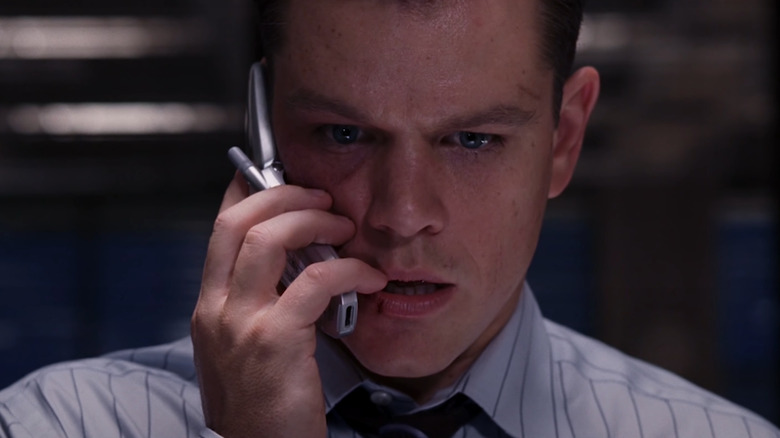Editing The Departed Was Like Wrangling Wild Horses For Martin Scorsese
In late 2018, when Howard Stern asked Jonah Hill about working with Martin Scorsese on "The Wolf of Wall Street," Hill was effusive in his praise of the veteran filmmaker. There's no doubt that Scorsese is one of, if not the greatest living director. According to Hill, a lot of that has to do with his ability to problem-solve. As the actor sees it, "directing is just solving issues constantly," and he claimed to have witnessed first-hand Scorsese's ability to "close his eyes and then solve an insanely complex issue" in 30 seconds.
By the time it came time to film 2006's "The Departed," Scorsese had been around long enough — his filmography stretches all the way back to the '70s — to know what he wanted and how to make it happen. And as some unprecedented behind-the-scenes footage shows, the director approached his Leonardo DiCaprio and Matt Damon-led crime thriller drama with a cool equanimity, demonstrating with every calmly uttered direction an easy command of his craft.
Partly a remake of the 2002 Hong Kong film "Infernal Affairs," it also worked in real-life mob history by using the Boston Winter Hill Gang as inspiration. Specifically for Jack Nicholson's mafia boss Frank Costello, who was based on infamous Irish-American gangster Whitey Bulger. In the film, Costello plants one of his men, Colin Sullivan (Damon), within the Massachusetts State Police. Sullivan ends up playing out a tense cat-and-mouse game with undercover State Trooper Billy Costigan (DiCaprio) who's embedded in Costello's gang. It makes for a riveting and potentially convoluted narrative.
Thankfully, with Scorsese and his problem-solving prowess in charge, it all plays out beautifully. But "The Departed" almost got away from him when he sat down to edit the whole thing.
'I'll figure it out later'
Written by "Kingdom of Heaven" scribe William Monahan, "The Departed" contains all the vintage Scorsese themes. Jealousy, greed, murder, guilt — it's all here. But much of it seems to have come together on set, as the director encouraged his actors to improvise, and worked with Monahan to adapt the script as they shot.
In a 2019 conversation with fellow film nerd Quentin Tarantino for the Director's Guild, the filmmaker explained how he had to shoot four extra days due to the script being constantly amended:
"We were changing it so much in the middle of the film when we were shooting. I kept working with Bill Monahan and everybody rewriting stuff. It got so complicated that, at one point, my continuity person said, 'Where do you want this new scene [that] just came in?' I said, 'Put it in the middle with everything else. I'll figure it out later.'"
Martin Scorsese's flexibility seemed to go down well with Jack Nicholson, who embraced the chance to improvise. At one point, he asked the prop master to hide a gun on set just so he could pull it on Leonardo DiCaprio during a tense scene. The legendary actor also got in on the rewriting process, adding his own unique — and downright disturbing — dialogue to scenes, including where he shoots a woman only to remark that she "fell funny."
Unsurprisingly, in the edit bay, there was an excess of scenes, which made the whole process a challenge. As Scorsese told Tarantino, "Sure enough, in the end, it was like we were wrangling six wild horses, me and [editor] Thelma [Schoonmaker]." Luckily, the pair managed to get a grip on it all and produce a film that would gain the revered director his one and only Oscar win — to date — for best director.
Heavy lies the crown
I should note "The Departed" is not an exception to the rule. Martin Scorsese has always been open to having actors improvise and tweaking a script on set. As Jack Nicholson told Variety in 2007, "Marty is very free with his ideas." This gives his films a feeling of spontaneity and grounded reality, even when they depict outlandish behavior. In the case of "The Departed," Scorsese's willingness to adapt things on the fly may have made the editing process a nightmare but it certainly seems to have paid off in the end.
That said, there's a lot to love about William Monahan's script — as the screenwriter eloquently put it himself, it would "make a literature professor wet himself." Take for instance, Nicholson's scene with Leonardo DiCaprio, where in his efforts to flush out the rat in his squad, Costello (Nicholson) tries to intimidate Costigan (DiCaprio). (It helps that Nicholson is firing on all cylinders, and the surprise gun reveal that DiCaprio wasn't expecting is the icing on the cake.) But the dialogue is brilliant here.
It makes you wonder how much of Monahan's rich dialogue was retained and how much of it was rewritten on the day of the shoot. (Imagine writing such dialogue on the spot, that's pretty impressive.) Scorsese made it work, even if it did result in a mountain of footage for the director to sift through later. Maybe such challenges are par for the course when you're the best at what you do. Or as Costello growls to Costigan in a Shakespeare misquote: "Heavy lies the crown."


